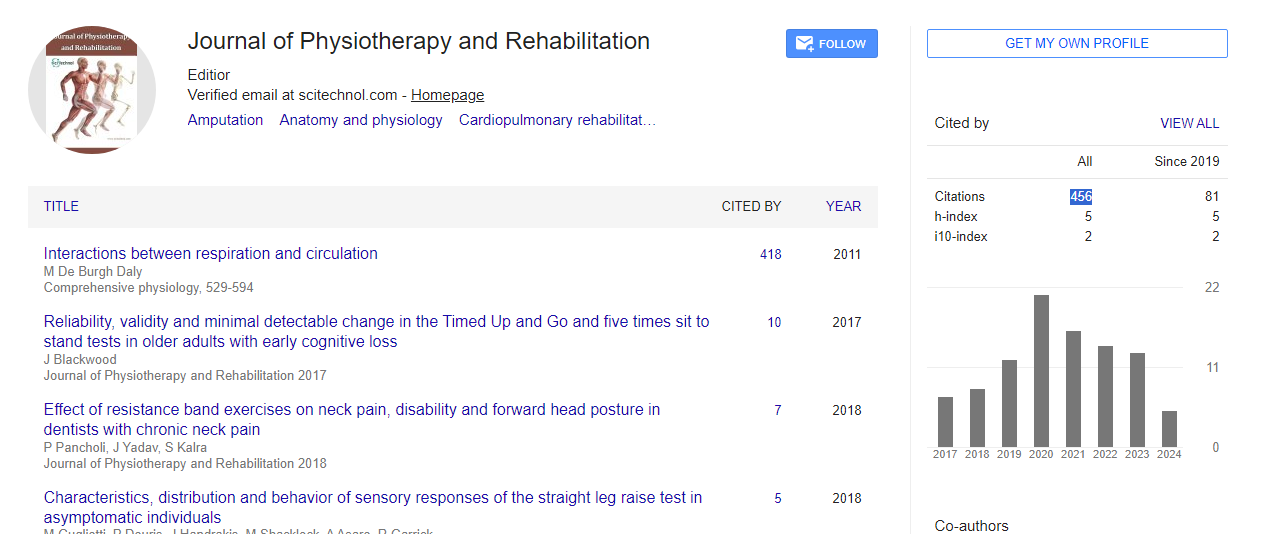Commentary, J Physiother Rehabi Vol: 7 Issue: 2
Reducing Fibromyalgia Symptoms and Improving Quality of Life
Masahiro Minta*
Department of Physiology, Daegu Haany University, Daegu, South Korea
*Corresponding Author: Masahiro Minta
Department of Physiology, Daegu Haany University, Daegu, South Korea
E-mail: masahmint@dhu.ac.kr
Received date: 22 March, 2023, Manuscript No. JPTR-23-99188;
Editor assigned date: 24 March, 2023, Pre QC. JPTR-23-99188 (PQ);
Reviewed date: 15 April, 2023, QC No. JPTR-23-99188;
Revised date: 22 April, 2023, Manuscript No. JPTR-23-99188 (R);
Published date: 28 April, 2023, DOI: 10.4172/JPTR.1000128
Citation: Minta M (2023) Reducing Fibromyalgia Symptoms and Improving Quality of Life. J Physiother Rehabi 7:2.
Description
Fibromyalgia is a chronic pain disorder characterized by widespread musculoskeletal pain, fatigue, sleep disturbances, and cognitive difficulties. Although the exact cause of fibromyalgia is unknown, it is believed to involve a combination of genetic, environmental, and psychological factors. Diagnosis of fibromyalgia involves ruling out other conditions that may present with similar symptoms.
There are several medications that may be used to manage fibromyalgia symptoms. These include pain relievers, antidepressants, and anti-seizure medications. It is important to work with a healthcare provider to determine the best medication regimen for individual needs and to monitor for any side effects.
In addition to medications, lifestyle changes can also help reduce fibromyalgia symptoms and improve quality of life. Regular exercise, a healthy diet, stress management, and good sleep hygiene are some of the lifestyle changes that can be helpful. Exercise is an important component of managing fibromyalgia. Low-impact exercises such as walking, swimming, or yoga can help improve flexibility, reduce pain, and improve sleep. A healthy diet rich in fruits, vegetables, whole grains, and lean protein sources can help reduce inflammation and improve overall health. Stress can exacerbate fibromyalgia symptoms, so it is important to practice stress management techniques such as meditation, deep breathing, or relaxation exercises. Good sleep hygiene, such as establishing a regular sleep routine, avoiding caffeine and alcohol before bed, and creating a comfortable sleep environment, can help improve sleep quality in people with fibromyalgia.
In the conventional treatments, some people with fibromyalgia may benefit from alternative therapies such as massage, acupuncture, chiropractic care, and meditation. These therapies can help to alleviate pain and improve relaxation, but it is important to note that there is limited scientific evidence to support their effectiveness in treating fibromyalgia. Alternative therapies should not be used as a substitute for conventional treatments. It is also important to speak with a healthcare provider before starting any new therapy to ensure that it is safe and appropriate for individual needs.
Managing fibromyalgia symptoms also involves self-care strategies. Getting regular exercise, eating a healthy diet, and getting enough restful sleep are essential. Other self-care strategies that can help manage fibromyalgia symptoms include pacing activities, setting realistic goals, and seeking social support.
Pacing activities involves breaking up activities into smaller parts and taking frequent rest breaks. This can help prevent overexertion and conserve energy. Setting realistic goals involves focusing on achievable goals rather than overwhelming ones. This can help to reduce stress and improve motivation. Seeking social support can also be helpful. Talking to friends and family, joining a support group, or seeing a therapist can provide emotional support and help with coping.
Fibromyalgia is a chronic pain disorder that can be managed through a combination of medical treatments, lifestyle changes, alternative therapies, and self-care strategies. Although there is no cure for fibromyalgia, these strategies can help to reduce symptoms and improve quality of life for people living with this condition. It is important to work with a healthcare provider to determine the best treatment plan for individual needs.
 Spanish
Spanish  Chinese
Chinese  Russian
Russian  German
German  French
French  Japanese
Japanese  Portuguese
Portuguese  Hindi
Hindi 